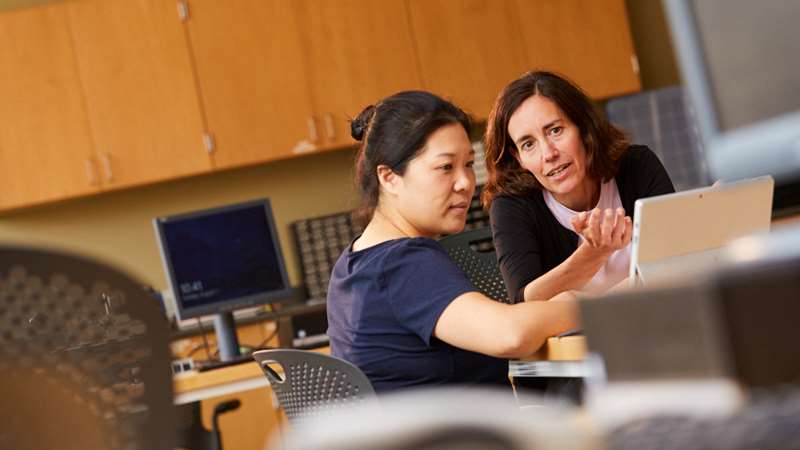Joint Department of Biomedical Engineering
About Us

People
Learn more about the people that lead the Joint Department of Biomedical Engineering and develop new and innovative educational programming in engineering, science, and design. The program is pioneered by:
Education
The Joint Department provides students with a wealth of engaging clinical and research experiences designed to shape them into a leaders in the field of Biomedical Engineering.
Research
The MU-MCW Joint Department of Biomedical Engineering facilitates collaborative research between world-class engineers and faculty physicians. With over 30 state-of-the-art laboratories, the Joint Department promotes research initiatives seeking solutions to modern healthcare challenges. These research efforts offer Marquette engineering students access to MCW physicians and scientists, and create ample opportunities for grants from the National Institutes of Health and National Science Foundation.
Research Themes:
Biomechanics & Rehabilitation Bioengineering
Biomedical Imaging
Computational Systems Biology & Medicine
Medical Devices & Bioinstrumentation
Molecular, Cellular & Tissue Engineering
Neural Engineering & Neurorehabilitation
MCW's Biomedical Engineering Laboratories
Directed by Joint Department primary faculty, Biomedical Engineering Laboratories supported by the Medical College of Wisconsin seek engineering solutions to real-world problems identified by investigations in biomechanics, computational systems biology & medicine, medical devices design and bioinstrumentation, cellular and tissue engineering, neural engineering and neurorehabilitation.
-

Airway Biomechanics Laboratory
The Airway Lab studies respiratory physiology to develop new technologies for the diagnosis and treatment of respiratory diseases. -

Cardiovascular Regenerative Engineering Laboratory
To develop next-gen solutions for cardiovascular disease, CaRE Lab creates living-tissue valves and grafts for the human heart. -

Computational Lung Physiology Laboratory
The CLPL uses experimental computational modeling strategies to better understand processes involved in lung injury and disease. -

Computational Systems Biology Laboratory
CSBL uses experimental and computational modeling approaches to investigate the physiological mechanisms of mitochondrial function. -

Nanomedicine and Image-Guided Interventions Laboratory
NIGIL uses nanotechnology to develop minimally invasive strategies to combat cancer, infectious disease, and vascular pathologies. -

Neural Engineering & Modulation Laboratory
The NEMo Lab uses neuroprosthetic and gene-therapy approaches to alleviate motor deficits caused by neurologic injury or disease. -

Pelvic Diagnostics & Therapeutics Laboratory
PDaT Lab research seeks to help those impacted by urinary, sexual, and bowel dysfunction, with a special focus on addressing women’s health issues. -

Regenerative Engineered Biomaterials Lab
The Regenerative Engineered Biomaterials Lab works to improve the performance of advanced biomaterials for use in medical devices. -

Sensory Neuroscience Attention and Perception Laboratory
The SNAP Lab uses psychophysical and neuroimaging methods such as MRI to study the neurobiology of attention and perception. -

Tissue Regenerative Engineering Laboratory
TRE Lab investigates regenerative progression to develop bio-functional engineered tissues for the treatment of birth defects. -

Trauma Biomechanics Laboratory
The TBM Lab utilizes state-of-the-art facilities to investigate human injury tolerance to impact in automotive, aviation, aeronautic, sport and military environments. -

Zablocki VA Medical Center Laboratories
ZVAMC Labs support a dynamic group of collaborative researchers investigating trauma to and rehabilitation of the central nervous system and spine.
Marquette's Biomedical Engineering Laboratories
Biomedical Engineering laboratories supported by Marquette University engage Joint Department Faculty in a dynamic range of investigations into such disciplines as medical device design, neural engineering, imaging, orthopaedics and rehabilitation engineering.
-

Biophotonics Lab
The Biophotonics Laboratory develops light-weight non-invasive medical technologies for use in low- and middle-income countries. -

INERL
INERL consists of six facilities supporting research at the cross-section of biomechanics, neural and rehabilitation engineering. -

INSL
INSL uses behavioral studies, brain imaging and computational modeling to investigate neural control of visually guided movement. -

NMCL
The NMCL seeks to provide the knowledge and tools needed to deliver individualized therapeutic interventions for motor deficits. -

OCVL
The OCVL uses non-invasive imaging strategies to visualize the retina and better understand vision in health and disease. -

OREC
OREC coordinates labs from Marquette, MCW and affiliative organizations investigating orthopaedics and rehabilitation engineering.
Graduate Seminar Series
The Graduate Seminar Series invites working Biomedical Engineers to discuss ongoing research and recent innovations covering a wide range of topics, including computational modeling, imaging, regenerative medicine, and device design.
Graduate Programs
Prospective students may further their growth in the field through their choice of several Master's programs with science and engineering focuses, or a Doctor of Philosophy in Biomedical Engineering Doctoral Program.
Marquette-MCW BME Graduate Programs
Undergraduate Programs
Undergraduate students can enroll in a curriculum that leads to a Bachelor of Science Degree in Biomedical Engineering. Students may choose between 3 distinct majors or seek a 5-year combined BS/MS in Biomedical Engineering.
Marquette-MCW BME Undergraduate Programs
Giving
Support the Marquette-MCW Biomedical Engineering Program





